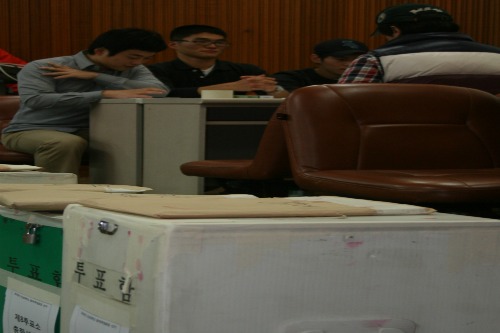After two elections, an emotionally-driven electorate chairing committee, endless debates and discussions, and even a lawsuit, the 2012 GSC Elections has been one of the most controversial elections for years. What we see is the nonchalant tune of each side aiming for the position, raising their voices to heights as if it was the basis of righteousness and justice notwithstanding the attempt to not accept mistakes made by both sides. Invariably, both of the parties semi-coat themselves with the promises of ‘true student representation’—but does our university’s GSC really aim to represent students?
Review of the 2012 GSC Elections
The first ballot counting last November 29, 2011 foresaw a coming storm. With the loss of the ballot registers from the College of Humanities, votes from the said college were supposed to be invalid, having incurred more than 3 percent error. Shouting upfront without any consideration to the rules of the Central Election Management Committee (CEMC), the decision was opposed by Action, the opposition party, saying that by doing so, the CEMC was ignoring the students from the said college. While Action’s daring motion during the ballot counting received a warning from the CEMC, they were declared elected nonetheless, which was naturally opposed by Junsul, the administration party. Junsul filed an appeal to reverse the decision was “unjustifiable” because “the election rules show that the error percentage crossed the acceptable limit”. So the decision in the first ballot count was overturned and resulted to be in favor of Junsul. During the two day vigil, the drama was tense and nobody wanted to lose.
A Re-election was then sought by the CEMC, but the ballot count turned out to be a hot ring of debate and confrontation. With the same fiery attitude, Action again raised their voices for the chance to get the position back in their hands. The disturbance has brought a huge delay in the ballot counting process once more, with a much more complicated backdrop—the then members of the elected GSC, members of Junsul, had dropped a bomb on CNU that mortified the image of Action as a leftist party known as the ‘Red Pamphlet’, the electorate committee chair of the College of Humanities claim of theft, the non-representation of the Special Education Department of CNU, and most importantly a whopping 17 percent student turn-out in the re-election. A lawsuit then followed the ordeal, with the initiative of Action, non-ending talks, debates and discussions, and an empty GSC for 2012.

Is the GSC Fit to Be the Leader Group of CNU Students?
Yes, the election for the 2012 GSC has seen an irresponsible CEMC emotionally driven to what seems to be little knowledge of the loopholes of the election rules of CNU. But CNU students focus more on the problem at hand: an unclear future for the GSC. Looking at the very low student-voter turn-out in the re-election, Yoon Je-young (Senior, Dept. of Anthropology), Chair of the CEMC, says that it is still “a right of the least 17 percent to vote and be heard”. GSC driven by personal goals and a very low turn-out in the elections—have the students of CNU given up on the GSC for good?
“CNU students do not see these people, the members of the GSC, working for them” says Jang, a graduating student from the College of Law. “Personally, during my stay at CNU, I haven’t really seen any change in the GSC, may it be Action or Junsul. Maybe last year there was some initiative, but it was not enough. These people need to be visible to the students so that the students will feel the need to participate as well”. Min Byeong-su (Senior, Dept. of Business Administration) says that “the reason why student turn-out in the elections was low is practically because they do not see the need to actually participate in it. They don’t see the different parties, but people who will serve for their purposes in the future, and they see the same people.” In a way, students have felt indifference all of these years and have gradually detached themselves from the GSC.
The GSC Has Establish Its Leader Credentials
It is a very saddening fact—with problems within the GSC unsolved and a growing wall between the students and the GSC, what now is the need to have this institution within the gates of CNU? Hwang, a Junior from the Division of Self-Designed Interdisciplinary Studies said that “the GSC should learn to listen to the students, to the tides of change”. Can this problem still be solved? Is there any way to change the students’ perception of the GSC? “The GSC is an institution that represents the students. They should enable the students to participate in all of its activities and produce more programs that stimulate communication and participation within different ranks of students at CNU” she suggests.
Jeong U-yang, Chief of the Office for Student Affairs, says a key role that the GSC should follow. “May it be Action or Junsul, one thing is to be secured: those who aim for office should keep in mind how to create a better CNU, how to build an environment that nurses some of the country’s best students. Forget about pride and the position, those who have the heart for change to uplift the name of CNU and its students should take part in the GSC. As intellectuals of Honam’s pride, may the future student leaders of CNU be one that nurtures the passion for developing future leaders of CNU.” May the future student leaders of CNU be true servant leaders yearning to hear from the people they serve, the students of CNU.
By Rigoberto Banta Jr., Student Editor
[News Focus]
제이 반타 기자
tribune@cnumedia.com

